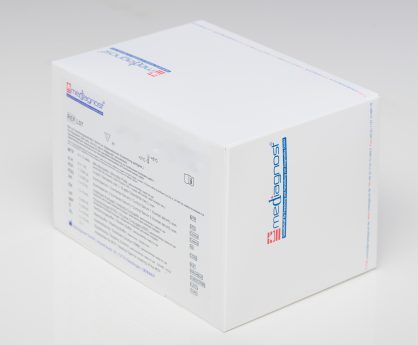Mouse Adiponectin ELISA Assay
The Mouse Adiponectin ELISA Assay is For Research Use Only
Size: 1×96 wells
Sensitivity: 0.008 ng/ml
Standard Range: 0.025 – 1 ng/ml
Incubation Time: 2.5 hours
Sample Type: Serum, Plasma
Sample Size: 10 µL
Manufactured by Mediagnost
Assay Principle
The Mouse Adiponectin ELISA Assay Kit is a so-called Sandwich-Assay using two specific and high affinity antibodies. The Adiponectin in the samples binds to the first antibody coated on the microtiter plate. In the following step the second specific anti-Adiponectin-Antibody binds in turn to the immobilised Adiponectin. The second antibody is biotinylated and will be applied in a mixture with a Streptavidin-Peroxidase-Enzyme Conjugate. In the closing substrate reaction the turn of the colour will be catalysed quantitatively depending on the Adiponectin-level of the samples.
Specimen
Serum and plasma samples of mice and mouse cell culture medium can be used in this assay. Influence of Heparin (30 IE/mL), EDTA (6,8 mM) and NaCitrat (0,015 M) on the measurement of Adiponectin has been investigated be recovery experiments. PBS was enriched with recombinant mouse Adiponectin and the above mentioned substances. No significant influence on the recovery of adiponectin was detected.
Hemolytic reactions have to be avoided. The blood has to be allowed to clot and after complete clotting, serum is separated by centrifugation.
Sensitivity
The analytical sensitivity of the Mouse Adiponectin ELISA yields 0.008 ng/mL (equal to < 0.0008 ng per well; as 2xSD of zero standard in 22fold determination).
Related Products
Rat Adiponectin ELISA Assay Kit
Human Adiponectin ELISA Assay
Adiponectin High Sensitive ELISA Assay Kit
Assay Background
Adiponectin was described for the first time in the early 90th of the last century as an endocrine factor produced by adipocytes. Adiponectin is involved in the regulation of energy- and fat metabolism. So its concentration in the circulation is said to reflect the risk of atherosclerosis and the degree of insulin resistance. Based on the high incidence of these diseases, adiponectin was and still is the object of intensive research regarding the underlying biological mechanisms and regarding its value as biomarker. Beside different cell culture models and studies with human patients, mice and rats are suitable model organisms for basic research and pre-clinical studies.
Therefore we developed and validated this test system as a tool for adiponectin measurements in mice usable in research and pre-clinical studies. Even if the comparability of mice and humans is limited we offer some background information on human adiponectin physiology in the following section:
Adiponectin is a 30kDa protein which percentage in serum proteins is 0.01%. It is mainly synthesized by Adipocytes, but also muscle cells and hepatocytes have the ability to synthesize Adiponectin. Until now, IGF-I is the only known natural inductor of the synthesis. It consists whole-body Collagen-like N-terminal and a globular C-terminal domain [1]. In vivo Adiponectin appears with different oligomers. Beside the trimer and ditrimer also high molecular multimers exist [1-3]. Up to now two different receptors are known, both receptors are ubiquitary expressed, though the distribution in the tissues varies. The Adiponectin Receptor 1 (AdipoR1) is especially in muscle- and AdipoR2 in liver tissue synthesized [4].
The significance for the organism is not clear until now. First studies show, that adiponectin correlates negatively with BMI and thus it could have relevance for the energy metabolism for example through the regulation of fatty acid oxidation. Besides the correlation with BMI, Adiponectin level is associated with the Insulin-Resistance [5-7] and so also linked with Type II Diabetes. Adiponectin is associated also with glucose- und lipometabolism [8, 9].
The formerly proposed diagnostic value of the high molecular weight form of adiponectin was not verified using a commercially available test system for the determination of HMW adiponectin [10]. Blueher et al. clearly demonstrate that regarding the diagnosis of insulin resistance, measured by whole-body glucose uptake below 40 µmol/kg*min, total adiponectin as determined with the Eagle Biosciences Adiponectin ELISA Assay Kit (Cat#E09), is with an area of 0.92 under the receiver-operating curve, of greater diagnostic value [10].
Furthermore, it is involved in inflammatory processes [11-15] and therewith it is of importance for the appearance of arteriosclerosis [4, 5, 16] and coronary disease [17, 18], thus the determination of Adiponectin level in plasma could serve to estimate the risk of coronary disease [19, 20]. Beside this Adiponectin influences further physiological processes as for example the angiogenesis [21, 22].
Assay Notes
The Eagle Bio Mouse Adiponectin ELISA standards are prepared from native Adiponectin in concentrations of 0.025, 0.075, 0.15, 0.3, 0.65 and 1 ng/ml and the native Adiponectin was calibrated against the recombinant Protein (Manufacturer: R&D Systems, Wiesbaden).
Package Inserts
Please note: All documents above are for reference use only and should not be used in place of the documents included with this physical product. If digital copies are needed, please contact us.


